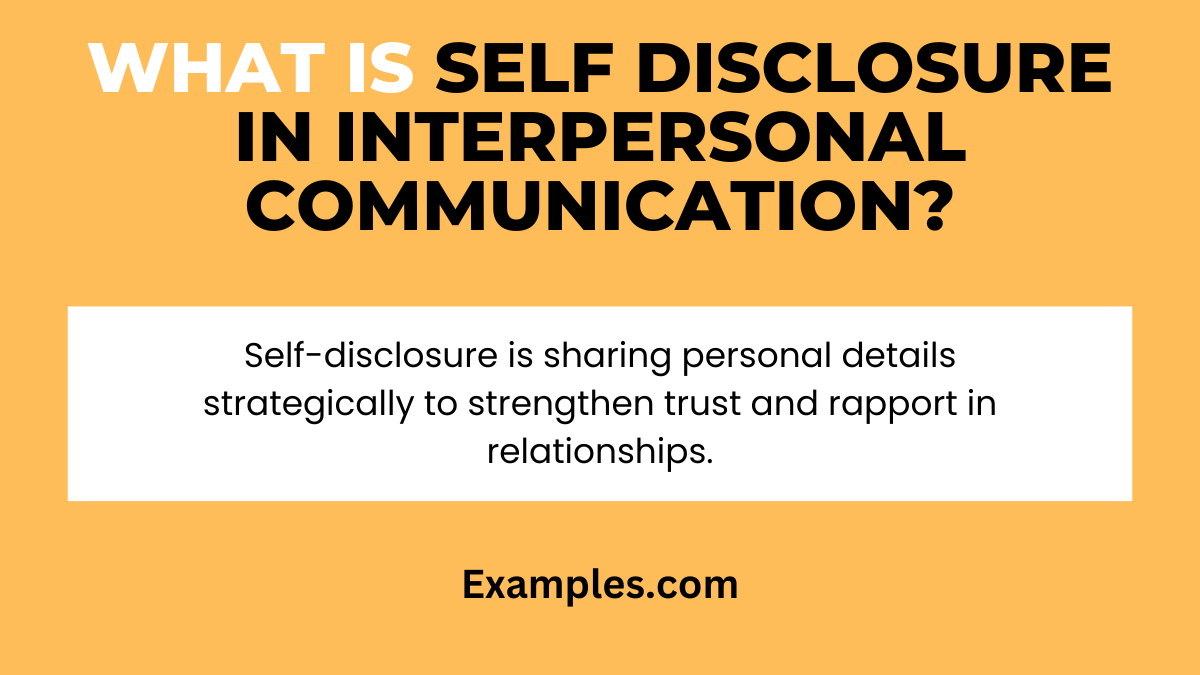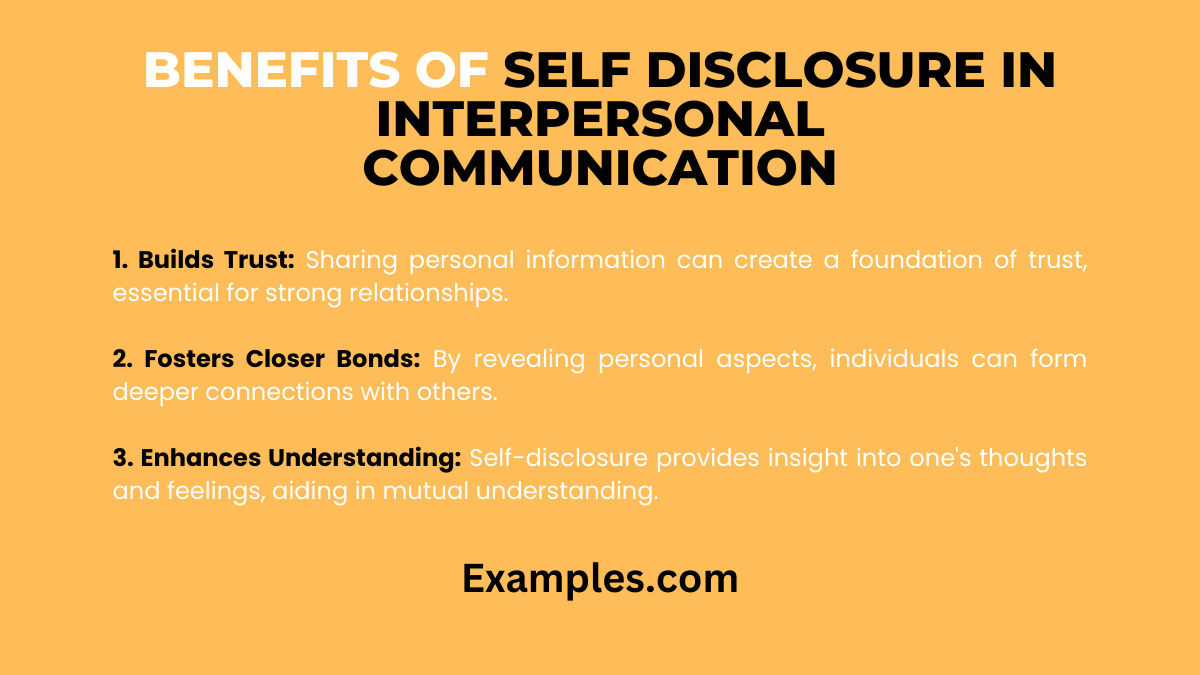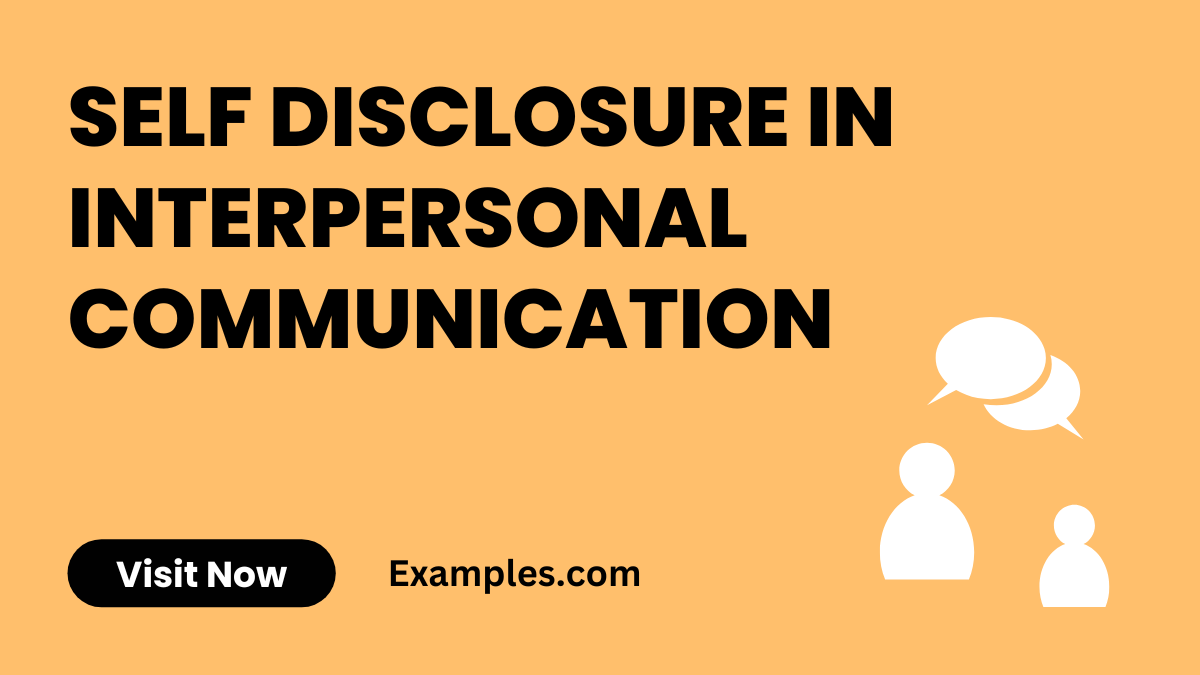Self Disclosure in Interpersonal Communication Example [Edit & Download]
Self-disclosure in interpersonal communication is a vital component, especially in oral communication. It involves voluntarily sharing personal information with others to foster deeper connections and trust. This sharing can range from disclosing preferences and experiences to revealing emotions and vulnerabilities. Effectively managing self-disclosure is key to building meaningful relationships, whether in personal life or professional settings. It’s a balance of openness and discretion, enhancing understanding and empathy in interactions.
What is Self Disclosure in Interpersonal Communication? – Definition

Self-disclosure in interpersonal communication refers to the act of revealing personal information to others. This can include thoughts, feelings, experiences, and aspirations. It is a strategic and selective process, forming the basis for deeper relationships and trust. Effective self-disclosure is not just about sharing but also about the context, timing, and the relationship between the individuals involved. It plays a crucial role in building rapport, enhancing understanding, and facilitating closer connections in both personal and professional communications.
Benefits of Self Disclosure in Interpersonal Communication

Self-disclosure in interpersonal communication offers several benefits, enhancing both personal and professional relationships:
- Builds Trust: Sharing personal information can create a foundation of trust, essential for strong relationships.
- Fosters Closer Bonds: By revealing personal aspects, individuals can form deeper connections with others.
- Enhances Understanding: Self-disclosure provides insight into one’s thoughts and feelings, aiding in mutual understanding.
- Facilitates Emotional Support: Openly expressing vulnerabilities allows for greater emotional support from others.
- Promotes Empathy: Understanding each other’s experiences fosters empathy, a key component of effective communication.
- Improves Communication Clarity: Honesty in self-disclosure helps in clear and direct communication, avoiding misunderstandings.
- Encourages Reciprocity: When one person discloses, it often leads others to share as well, enhancing dialogue.
- Reduces Stress: Sharing personal concerns can relieve the stress of keeping emotions bottled up.
- Aids in Conflict Resolution: Understanding each other’s perspectives through self-disclosure can resolve misunderstandings and conflicts.
- Supports Personal Growth: Reflecting on and sharing one’s experiences can lead to personal insights and development.
Why is Self Disclosure Important in Interpersonal Communication?
Self-disclosure is a key element in interpersonal communication for several reasons:
- Deepens Relationships: It allows people to move beyond superficial interactions, creating deeper and more meaningful relationships.
- Promotes Transparency: Encourages honesty and openness, which are vital for trust and credibility.
- Facilitates Emotional Well-being: Sharing personal thoughts and feelings can improve mental health and emotional well-being.
- Encourages Mutual Understanding: Helps individuals understand each other’s perspectives, values, and motivations.
- Strengthens Team Dynamics: In a professional setting, self-disclosure can build team cohesion and improve collaboration.
How Self Disclosure in Interpersonal Communication Affects Relationships
The impact of self-disclosure on relationships in interpersonal communication is profound:
- Enhances Intimacy: Sharing personal information can turn acquaintances into close friends or deepen existing relationships.
- Builds Trust: Consistent and honest self-disclosure establishes a sense of reliability and trustworthiness.
- Shapes Perception: How much and what type of information is disclosed can influence how others perceive and respond to an individual.
- Balances Power Dynamics: In a professional context, appropriate self-disclosure can equalize hierarchical relationships, fostering a more collaborative environment.
- Navigates Boundaries: Understanding the limits of self-disclosure helps maintain healthy boundaries in both personal and professional interactions.
Self-disclosure in interpersonal communication is a delicate art. This guide provides valuable insights and tips for navigating the complexities of sharing personal information effectively. By practicing thoughtful and appropriate self-disclosure, you can build trust, deepen relationships, and create meaningful connections with others. Remember, the key lies in finding the right balance and ensuring that your disclosures contribute positively to the interaction.



